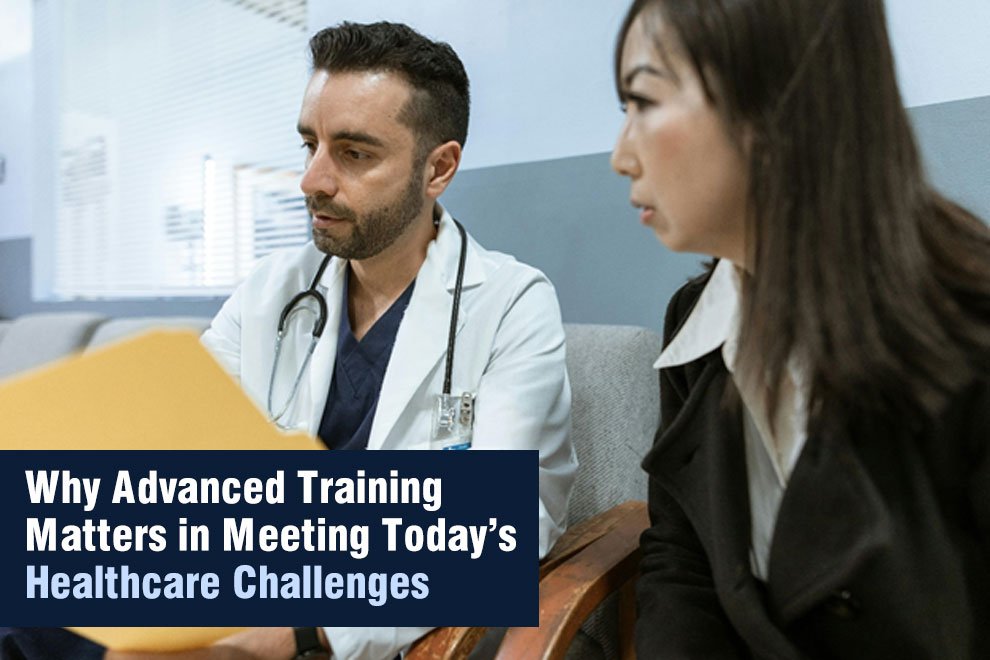Healthcare is changing at a rapid pace. From technological breakthroughs to global health crises, the way we think about care has shifted dramatically in just a few decades. At the same time, communities are facing an increase in chronic illnesses, widespread mental health concerns, and an aging population that requires ongoing support. These challenges demand more from healthcare professionals than ever before.
Passion and commitment are critical qualities in this field, but they are not enough on their own. Today’s professionals must combine dedication with advanced knowledge, specialized training, and the ability to adapt to complex systems of care. Without these skills, it becomes much harder to meet the growing needs of patients and communities.
Advanced training provides that bridge. It equips professionals to deliver effective care, take on leadership roles, and even contribute to research and innovation. To see why advanced education matters so much, it helps to begin with how new educational models are streamlining the path into healthcare roles.
Streamlining Education for Greater Impact
Healthcare careers often involve lengthy academic journeys. Students may spend years completing separate degrees before even entering practice. While this traditional route is still valuable, new approaches are helping aspiring professionals reach their goals more efficiently. For example, enrolling in combined masters and PsyD programs allows psychology students to complete two levels of study in a single, integrated path. It saves time, reduces overlap in coursework, and accelerates entry into advanced practice.
Streamlined education like this is not just about efficiency for students. It also responds to the urgent need for more qualified professionals in fields such as mental health. Communities across the country face shortages of trained providers, especially in underserved areas. By reducing the time it takes to prepare new professionals, combined programs help meet demand faster while still maintaining rigorous standards of education and training.
For healthcare to keep pace with modern challenges, we need more pathways like this, programs that prepare students thoroughly but also recognize the urgency of today’s workforce needs.
Meeting the Growing Demand for Mental Health Services
Mental health has become one of the defining issues of our time. Stress, anxiety, depression, and trauma affect people of all ages and backgrounds. These concerns not only impact individuals but also ripple through families, workplaces, and communities. The demand for professionals who can address mental health needs has never been higher.
Advanced training prepares professionals to handle this demand by giving them the tools to provide effective counseling, diagnose complex conditions, and create treatment plans that support long-term wellness. Without this level of preparation, the gap between patient needs and available services will only continue to widen.
By investing in education that focuses on advanced skills, professionals can step into roles that allow them to make a measurable difference. Whether through clinical practice, community outreach, or preventive programs, trained mental health providers are essential for improving outcomes.
Equipping Professionals to Handle Complex Patient Needs
Healthcare is rarely straightforward. Many patients face overlapping conditions, such as physical illness combined with emotional stress or socioeconomic barriers that affect their ability to follow treatment plans. Addressing these layered needs requires more than surface-level training.
Advanced education gives professionals the ability to view patient care holistically. Instead of focusing on one issue in isolation, they learn how to recognize the connections between physical, mental, and social health. This broader perspective leads to more personalized care plans, better patient compliance, and stronger long-term outcomes.
As patients continue to face increasingly complex challenges, the ability to integrate multiple areas of expertise will be one of the most valuable skills in healthcare.
Preparing Leaders for Healthcare Transformation
It’s not just patient care that requires advanced skills; healthcare systems themselves are in constant need of improvement. Shortages of staff, limited funding, and policy changes put pressure on organizations to adapt. To navigate these challenges, healthcare needs leaders who can think strategically, manage resources effectively, and advocate for patients at a systemic level.
Advanced training prepares professionals to step into these leadership roles. With education that emphasizes management, policy, and organizational dynamics, healthcare workers can move beyond day-to-day care and influence the direction of entire systems. Leaders trained in these areas are better equipped to improve efficiency, create supportive work environments, and ensure that patient needs remain at the center of decision-making.
By combining clinical expertise with leadership skills, professionals can help shape a healthcare system that is more responsive, sustainable, and equitable.
The Role of Research and Innovation
Healthcare will always face new challenges, and solving them often depends on research and innovation. Professionals who pursue advanced training are uniquely positioned to contribute to this process. They learn how to evaluate existing practices, identify gaps, and design new approaches to care.
In mental health, for example, practitioner-researchers might explore new methods of therapy, evaluate the effectiveness of community programs, or contribute to the development of policies that expand access to care. These contributions not only improve patient outcomes but also strengthen healthcare systems as a whole.
Innovation doesn’t happen in isolation. It comes from professionals who combine real-world experience with advanced academic training. By fostering both, advanced education ensures that healthcare continues to evolve in ways that meet future demands.
Ensuring Long-Term Career Growth and Sustainability
For professionals themselves, advanced training offers long-term benefits that go beyond immediate skills. It creates opportunities for specialization, career advancement, and stability in a field that is constantly changing. With advanced qualifications, professionals can choose roles that align with their interests, whether that means direct patient care, research, leadership, or education.
This flexibility also helps prevent burnout, a common concern in healthcare. When you have the option to grow and adapt your career, you’re more likely to find lasting satisfaction in your work. Advanced training isn’t just an investment in your education. It’s an investment in a sustainable, fulfilling career that can adapt as the healthcare landscape continues to change.
Healthcare is facing challenges on every level, from rising mental health needs to the complexities of chronic disease and the demands of policy reform. Meeting these challenges requires more than passion. It requires preparation, advanced knowledge, and the ability to adapt to an evolving system.
Advanced training makes that possible. It streamlines education, prepares professionals for complex patient care, builds leaders, encourages research and innovation, and creates sustainable career paths. Programs designed to accelerate learning while maintaining quality, such as combined degree options, are an essential part of building a workforce that is ready for today’s demands and tomorrow’s unknowns.
The future of healthcare depends on professionals who are ready to rise to these challenges. With advanced training, they can do more than respond to problems. They can lead the way in creating healthier, stronger communities for everyone.
Also Read: Why Emergency Response Training Matters More Than Ever










